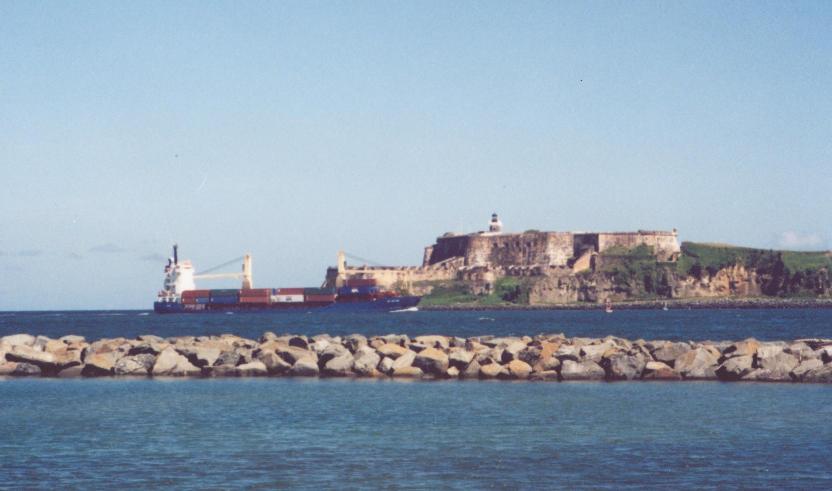A political history of Puerto Rico
In 1493, Christopher Columbus attacked the island of Puerto Rico, and thus, permanently altered the course of history for the small island. The infamous governor of Puerto Rico, Juan Ponce de Leon, was one of the main individuals helping the colonization of the island. Based on research from Irving Rouse, "After participating in the Higüey massacre, he served as translator for a party that traveled across the Mona passage, explored Puerto Rico, and discovered gold there," (Rouse, 155). So from that piece of information, we can see that Puerto Rico's history started with cruel colonization long before the Americans got hold of the island.
(credit: Wikipedia.com)
For years, the territory of Puerto Rico was treated as a mere commodity. Not long after the Spanish had claimed Puerto Rico as it's own, the Catholic church aimed to spread it's own influence into the area. Based on commentary from newadvent, "the same pope by the Bull "Pontifex Romanus" declared as suppressed and extinguished in perpetuity the aforementioned ecclesiastical province, with the three sees comprised therein, and by the same Bull erected three new dioceses:
two in Hispaniola (Santo Domingo and Concepción de la Vega); the third
was in the Island of San Juan, the name now given solely to the chief
city of Porto Rico, but which then applied to the whole island." (Jones, The Catholic Encyclopedia). Without any consent of the native peoples of Puerto Rico, the Pope had already decided this for them. This follows the theme of the Spanish colonizers taking over, and making changes that impact the native population without any kind of mandate for it. This matters, because to this day, Catholicism has supplanted and replaced the native religions of the original Taíno. In this sense, it is as if Puerto Rico and the memory of the native Taíno culture is a possession to be tossed around and to be used as it's colonizers see fit.
On the subject of Puerto Rico being treated as a possession, in 1595, England attacked the island hoping to secure it for themselves. Enter the feared Francis Drake, who led an attack on the island. Based on some research from workmall, "It was this redoubtable sea-rover who, according to advices received
early in 1595, was preparing an expedition in England for the purpose
of wresting her West Indian possessions from Spain," (workmall.com). While the two countries were nominally friends on the international stage, Drake loathed and detested the Spanish and that was used as a precursor for war. The end goal, as much as we can surmise from the context thus far, is that Puerto Rico was intended to be won as a prize and the consequences of this would be borne onto the people who live there instead of those making the decisions. Spain remained victorious and defended Puerto Rico, but had it lost England would have taken control of the island, treating it as a mere possession, although that is basically how Spain has treated the territory as well. This is a tradition that would continue forward for a long time for Puerto Rico.
Beginning in the late 1800's, the United States had been amassing a larger navy. Nationalistic thinking had taken hold over the country, and the country had begun to desire the colonized Spanish territories. Based on information from the Library of Congress, "Fervor for war had been growing in the United States, despite President Grover Cleveland's proclamation of neutrality on June 12, 1895," (“Introduction - The World of 1898: The Spanish-American War (Hispanic Division, Library of Congress)”). This fervor swelled until it reached it's apex upon the inauguration of President McKinley. It didn't take long for McKinley to declare war. While the war was costly, to the tune of $250 million and 3,000 lives (“Introduction - The World of 1898: The Spanish-American War (Hispanic Division, Library of Congress)”), it helped establish Puerto Rico as an American colony. This made America relevant on the world stage, as they had defeated what was at the time, a major world power. At the same time, being passed onto America was again, done without the consent of the people living there.Again, Puerto Rico was passed around like a political football. To this day, the territory remains under the control of the United States of America. It is subject to it's federal laws, but does not have the benefits that statehood would offer and lacks federal representation.
(credit: Britannica.com)
Works Cited:
Rouse, Irving. The Tainos. Amsterdam-Netherlands, Netherlands, Amsterdam University Press, 1992.
Jones, William. “CATHOLIC ENCYCLOPEDIA: Puerto Rico.” The Catholic Encyclopedia Vol. 12, www.newadvent.org/cathen/12291b.htm. Accessed 28 Mar. 2021.
“CHAPTER XVII.--DRAKE’S ATTACK ON SAN JUAN. 1595, Puerto Rico History.” Workmall.Com, workmall.com/wfb2001/puerto_rico/drake_s_attack_on_san_juan_1595.html. Accessed 28 Mar. 2021.
“Introduction - The World of 1898: The Spanish-American War (Hispanic Division, Library of Congress).” Library of Congress, www.loc.gov/rr/hispanic/1898/intro.html. Accessed 28 Mar. 2021.

Comments
Post a Comment